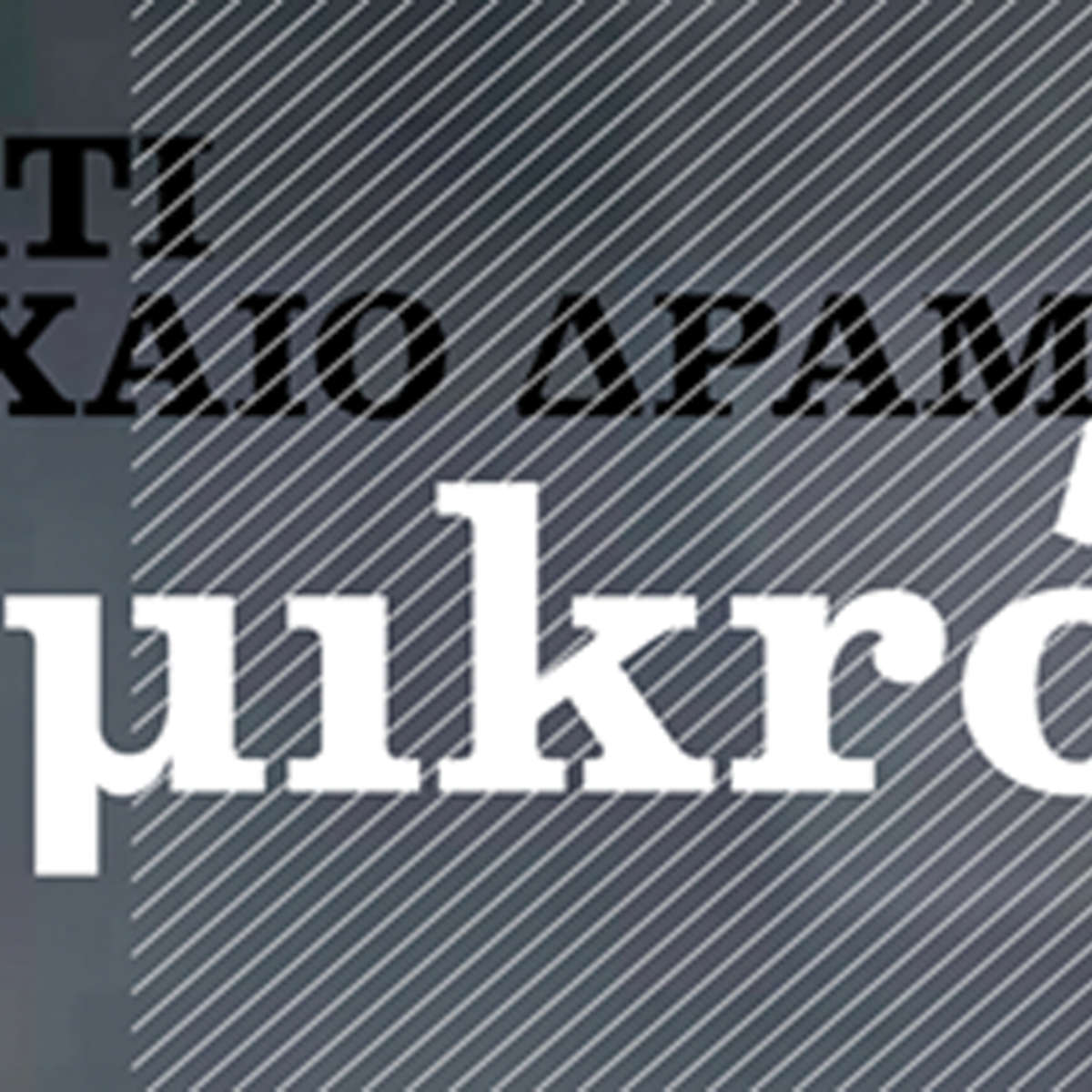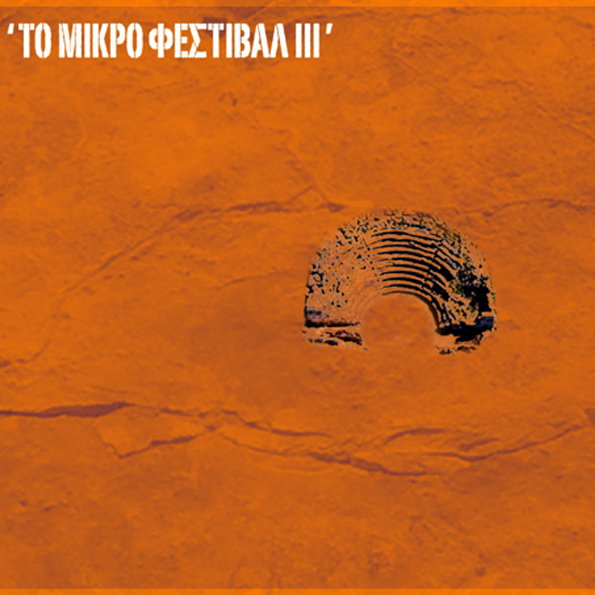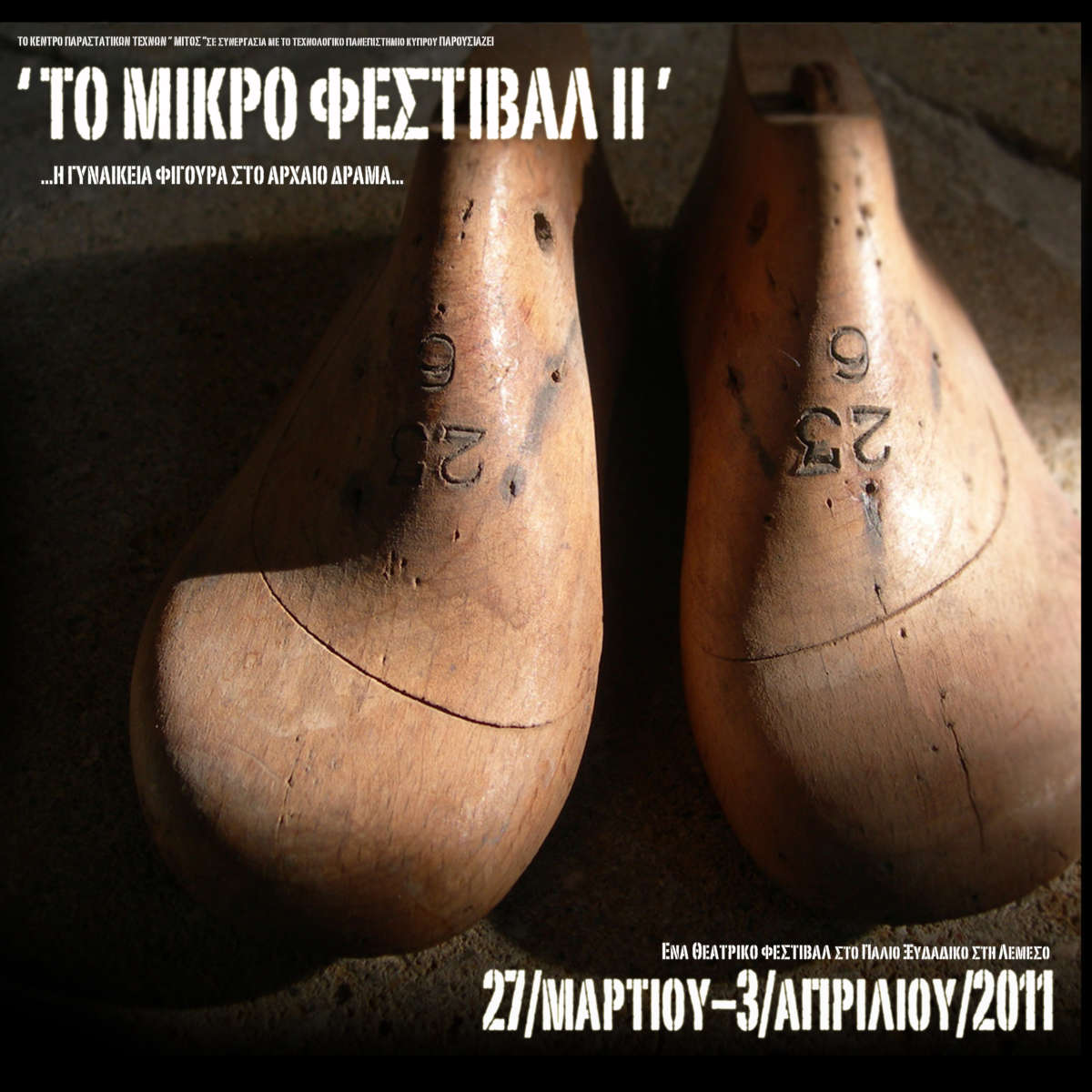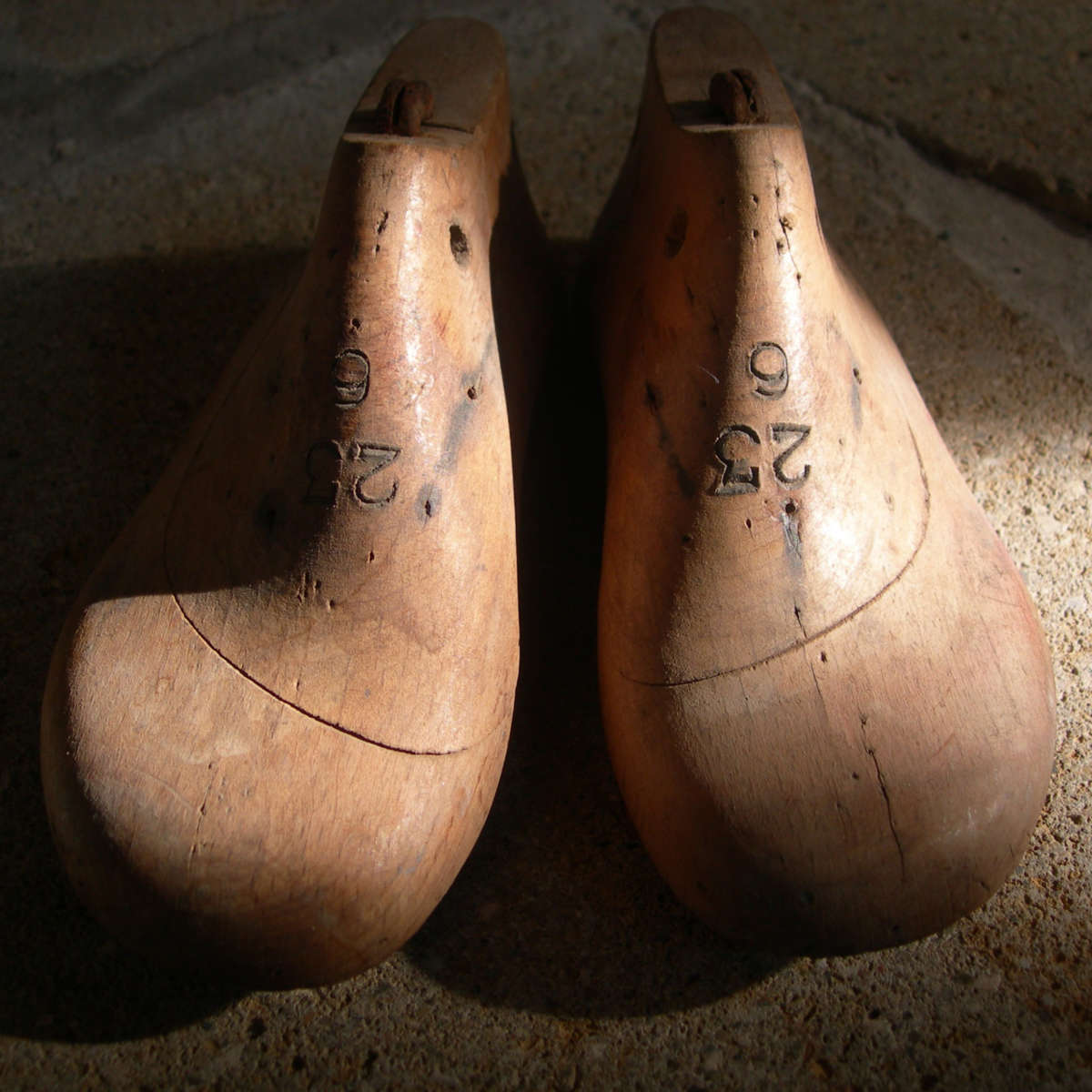3rd Mikro Ancient Drama Festival
Theme of the 3rd mikro ancient drama festival is "Deception". As in previous years, the festival took place at Old Vinegar Factory in Limassol. Organizers were Centre of Performing Arts MITOS, the Cyprus Centre of International Theatre Institute, Open University of Cyprus with the support of the Cultural Services of the Ministry of Education and Culture.
Deception occurs and as a concept and as a practice in most of the remaining works of ancient drama. The tragic poets build their mythological theme around deception, which is placed in the center of the plot, associated with the tragic irony and promotes adventure. The dramatic heroes, fall victims of frauds subordinated to the undeniable requirements of the trial, which leads to actions imperceptible.
Program
Letter to Orestis, direction Stephanos Droussiotis. Hidden are the Gods…on enemies crowns, Marios Ioannou amateur group. Philoctetes: Like a tragedy of the Greek left, proposal by the director Minas Tingilis. At Hades’ Gates: studies on a scene from Vatrachoi», direction Magdalena Zira. BACCHAE, theatrical group MITOS. «Live music duble flutes and tables». Ravi Saundankar and Jerome Desigaud. Atrides, directed by Yiannis Iordanides.
Closing Symposium
In collaboration with the Open University of Cyprus. Coordination by Andri Ch. Constantinou. Proposals from the OUC academics Deceit and prophecy in Sophocles’ Philoctetes, Vagios Liapis and Devious Euripides of Medea, Antonis Petrides. The quality of deceit – “Virtuous” and “Devious” in Euripides’ Bacchae, by the PhD candidate Rania Iacovou. From the dramaturg/researcher Ellada Evangelou Deceit in 18th and 19th Century’s Theatre: what brings us closer, sets us apart, hurts us? From the RECTUS CENTRUM director Apostolos Apostolides DECEIT? WHAT DECEIT? Theatrical lectern from Versus Theatre and a video projection by the students of the Bicommunal Highschool of Agios Antonios Lemesos, on the myth of Eleni.
Seminar
Polyphonic Songs with Lukas Walewski.
Letter to Orestis. Iakovos Kambaneli, by Stephanos Drousiotis
...after the murder of Agamemnonas, Klytaimnistra writes a letter to Orestis, as an attempt to justify herslef...
Direction:Stephanos Drousiotis, Music: Maurice Ravel, Umberto Giordano, Scenography: Stepahons Drousiotis, Lights: Stephanos Drousiotis, Lukasz Walewski, Sound: Charis Nikolaou, Lights construction: Pambos Ioannou, 3D set design: Nikolas Petrides, Stage construction: Vasiliadi, On stage: Marina Vrondi and Antreas Pavlou
*The figure of Orestis is a refernce of the young boy from «Deafman Glance», Robert Wilson, 1981.
«Hidden are the Gods…on enemies’ crowns», Marios Ioannou
Excerpts from «Agamemnon» of Aeschylus, «Bacchae» and «Medea» by Euripides.
Τhe opportunity to create a perfromance for mikro ancient drama festival is a gift to us, as an amateur team that lives and inspires by the sea of Limassol. A death begins by Agamemnon of Aeschylus, continues in Bacchae of Euripides and ends in Medea of Euripides again.
On the occasion of deception that the Festival raised as a concept, we fell in love with three images that we want to read: the soul, the body and our voice to you through them.
Klytaimnistra is welcoming her husband Agamemnonas. "It is also the sea and who will empty the sea" she says, and he mistaken and jovial, steps on the fraudulent red carpet and procees. We know ... Pentheas follows, dressed as a woman with veil, sees two suns at Theva and gives the bloody baton to Glafki... And then Medea triumphs.
The end is horrible as we knew from the beginning but we did not do anything. Maybe because we got a sense from the sensual illusion that perhaps we are gods and we know from before the fade of mortals and sense comes also for our unknown destiny ... our own alas, our own red carpet.
Dramaturgy/Direction: Marios Ioannou, Scenography/ Costumes: Demetra Gregoriou, Sound/ Lights: Lukasz Walewski, Music: Marios Ioannou, Photography: Achim Wieland, On stage: Maria Valvi, Elena Kalinikou, Anna Luchina.
«Philoctetes: Like a tragedy of the Greek left», proposal by the director Minas Tingilis. ETHAL 2013.
"People are suffering. Torture each other, hurt and wounded. No poem, no play can correct a mistake made once and ended up with a chronic incurable wound ... "writes Seamus Heaney in The Cure at Troy – adaptation of Philoctetes by Sofokles- because there is also Filoctetes of Euripides- fragments, even ... but also the one of Ziogas, Heiner Müller, Ritsou...
The specific «Philoctetes» has separated the performers into two camps. At first, the interpretation empasize the intent of the tragic poet to reach the depths of the human soul. The other school, club, camp - place the tragedy in the social context in which Sophocles acted, since every work of art associates with his era. The translator of the poet, George Blanas, notes in the preface of his translation that Philoctetes can be presented to us as the most existential of ancient dramas, but is more political, more relentless in it’s social criticism ...
One of the biggest casualties of art and even the dialectic of the version was recently the death of Theo Angelopoulos. And because ... the most important things have been said by poets, starting -like starting out from Aulida with our ship ETHAL for "Troy" - we will attempt to read Philoctetes as a representation, where a troupe of exiles / political prisoners will attempt to interpret the drama of the defeat of the Greek left submerged in Tartarus ....
Direction: Minas Tingkilis, Translation: George Blanas, Music/
Video: Giorgos Kolias, On stage: Odysseas:Eftihios Poulaides, Neoptolemos: Achilleas Gramatikopoulos.
At Hades’ Gates: studies on a scene from Vatrachoi», Magdalena Zera
In this central scene of Frogs from Aristophanis, it divides the play into two parts marking the entrance to Hades and the start of the theatrical competition. The main theme of the play creates a focal point and Dionysus seems to have reached the end of his journey. In front are the gates of Hades but at this point new adventures and trials begin, before allowing his entry. He has four different meetings with underworld creatures, he will do three costume changes, and when he finally manage to pass the threshold of the underworld he will not be wearing the costume of Hercules but the clothes of a servant.
A brilliant game of disguise and deception, but also a post- dramatic comment is located in the heart of the project. In the direction of Frogs for the summer by our team, the idea of the theater within the theater, "fraud" and the illusion through theatrical tricks, are central elements: a group of nine actors playing all the roles and dance with simple changes , celebrating the power of theater. In this presentation the two protagonists do a study on the limits of theatricality, of disguise, of fraud, of deception within a comical expression.
Direction: Magdalena Zera, Translation: Vaios Liapis, Music: Demetris Zavros, Actors: Demetris Antoniou, Valentions Kokkinos
«BACCHAE», theatrical group MITOS
«Poor Pentheus ... the disrespect to God Dionysus and the punishment that followed, brought him as far as to hold a prominent place in the realm of tragedy ... "
A new drama is presented as a comment on the text of Euripides. Dionysus never appears on stage, but its presence is strong throughout the presentation. The troupe of the army, is the focal point of the narration. Through a lengthy singing of the chocus it is presented the figures of history and the the action in the episodes. Specifically, three actors from Choros- embody all the tragedy’s heroes.
Bacchae performance completed in July 2012. It was a theater project, a way to search our theatrical identity, began in «Metrita, the Mourning of Pentheus» in 2009 and based on texts of ancient Greek tragedy and their performativity. In the 3rd mikro ancient drama festival we emphasized on the music part, with the participation of musicians Ravi Saundankar and Jerome Desigaud, who has been invited for this purpose from France.
Leading Project: Lukasz Walewski/ Elena Agathokleous, Dramaturgy: Rania Iakovou/ Elena Agathokleous, Light design: Alexander Jiotovic, light techinician: Menelaos Papagiorgis, Construction: Giorgos Mavrogenis/ Lukasz Walewski, Costume: Paraskevi Gelearaki, Photography: Pavlos Vrionidis. Participants: Diomedes Koufteros, Nikolas Arkadiou, Lukasz Walewski, Elena Agathokleous, Ravi Saundankar, Jerome Desigaud
«Atrides», directed by Yiannis Iordanides.
"Atreides" is a theatrical composition based on texts by Ritsos from his poetry collection "Fourth Dimension" and more specifically from the Mycenaean cycle. The famous myth of antiquity gives the poet an opportunity to weave his own story, universal and global, through texts with particular sensitivity. With tragic tones and with familiars he rebuilting the myth of Atreides by knitting yarns of yesterday with those of today.
The tragic dilemma of the central hero, Orestes, which stems from the search of a delicate balance between fierce judgment of a bloody act, inevitable, and the conquest of a profound knowledge, transforms into a painful and desperate struggle. Victim and perpetrator of his own self, is headed for the violent act of matricide, which stands front of the facade of a monstrous absurdity, through knowledge, and this makes him the opposite of Hamlet: "Consciousness makes us all cowards. Nature did not give a death mode, no institution of the unknown. Flashed the decision and immediately fades, it’s been blured by the humidity of thought. "
A modern interpretation of the myth of Atreides as Yiannis Ritsos and John Iordanides present it.
Direction: Giannis Iordanides, Stage design/Costumes/Light design: Giorgos Kotsakos, Assistant director/Music: Konstantinos Demetriou, Light: Lukasz Walewski, Cast: Orestis- Giorgos Anayiotos, Electra: Nataly Amman, Piladis: Michalis Aristidou
«Deceit and prophecy in Sophocles’ Philoctetes», Vagios Liapis
In Sophocles' Philoctetes, the case is woven around the oracle of Troaditi Helenus, indicating that the fall of Troy requires Philoctetes to return from exile with his unbeatable bows. By implementing the oracle, Odysseus decides to use deception to obtain the desired result. The exact terms of the prophecy is not clear from the beginning: at first it seems that only Philoctetes' bow is required for Troy’s fall, but later it’s been revealed (in the context however of a fake narration!) That the voluntary presence of Philoctetes is necessary. This creative ambiguity, combined with the gradual revelation of the prophecy conditions and the deceiving plan of Odysseus, promotes the plot of the play at all its key points.
«Devious Euripides of Medea», Antonis Petrides
This propsosal will give a different dimension to the concept of 'deceive' in ancient Greek tragedy. It will not refer to the mechanisms by which the tragic heroes mislead their opponents, but on the ways on which the tragic poets (re) organize their tragic myth on a base of a preexisting mythic, poetic and sometimes theatrical tradition. This work requires heuristic intellect, it just requires ‘deceive’: poets are invited to give a new twist on traditional stories without altering their basic outline; to manage, better to manipulate the volume of expectations and prejudices with which the
spectators enter the theater. This proposal will focus on the strategies that "deceitful" Euripides in Medea, managed to transform the ruthless witch, the brutal murderess myth in a tragic person capable of stimulating not only fear but also mercy; balancing dangerously between the familiar and the uncanny, the typical and extraordinary, the sympathy and repulsive, the "Self" and the "Other". The "fraudulent’’ Euripides manages to make Medea that shocks the viewer not so with her acts but with the fact that the play does not give a key for interpretation but brings a series of contradictions.
The quality of deceit – “Virtuous” and “Devious” in Euripides’ Bacchae, by the PhD candidate Rania Iacovou.
In tragedy, deception has an effective dramatic function, and promotes a suddently adventure that is a change in the hero's fate. From this change the tragic is being born and what creates the tragic irony is that the viewers know about this impending change which the hero ignores. In most projects, ‘deception’ is placed in the center of the plot and it determines the outcome of events. The quality, however, is determined by the intent of the deceiver and his actions. Therefore, we can speak of "good" and "evil" intention. A special category are the plays in which the gods hide behind their fraudulent actions. In this special group of plays, Bacchae has a prominent place. What constitutes this unique tragedy is that the same dramatic person, god Dionysus, acts with two kinds of deception. This god originally brings a "good" deception and when this works unsuccesfull he intents to use "evil" deception, bringing out through this manifestation the ambiguity of his ‘existence’.
«Deceit in 18th and 19th Century’s Theatre: what brings us closer, sets us apart, hurts us?» by the dramaturg/researcher Ellada Evangelou
When Europe came out of the Middle Ages, turned towards Enlightenment that brought together philosophic values and intellectual autonomy. Part of this new revolutionary consideration, is the revival of the "classic", as an expressed theme (often) through the Greek and Roman antiquity and structurally through the neoclassical model. The 19th century holds a new trend, Romanticism, which bulids a new literary form, full of different dimensions of time, past, present and future.
My intervention will host the trends and perceptions of playwrights form the 18th and 19th century on ‘deceit’, through theatrical literary works of European writers (Jean Racine, Lord Byron and others), and Greek-speaking (John Karageorgiadou, John Zampelios etc). Finally, aspires to answer the question of what of these elements are present in the perception of deception in our days and how form our identity.
RECTUS CENTRUM» director Apostolos Apostolides
Game of Gods?
Atonement travelling?
Revenge process?
Vindication?
Development of the subject
Open discussion with participants
Seminar
«Polyphonic Songs» with Lukas Walewski.
An introduction to polyphonic songs, through theory and practice. During this short workshop, we will travel to the traditional sounds of the Mediterranean, through the preparation of the body we will seek our voice, so that we can approach traditional polyphonic songs. The course is for all those who wish to work and to "understand" their voice.
Office Address:
Center of Performing Arts MITOS
Astiggos 1, 3016 Lemesos, Cyprus
Old Vinegar Factory Address:
Genethliou Mitella 34,
3036 Lemesos, Cyprus
Telephone:
(+357) 99 985232




